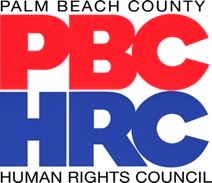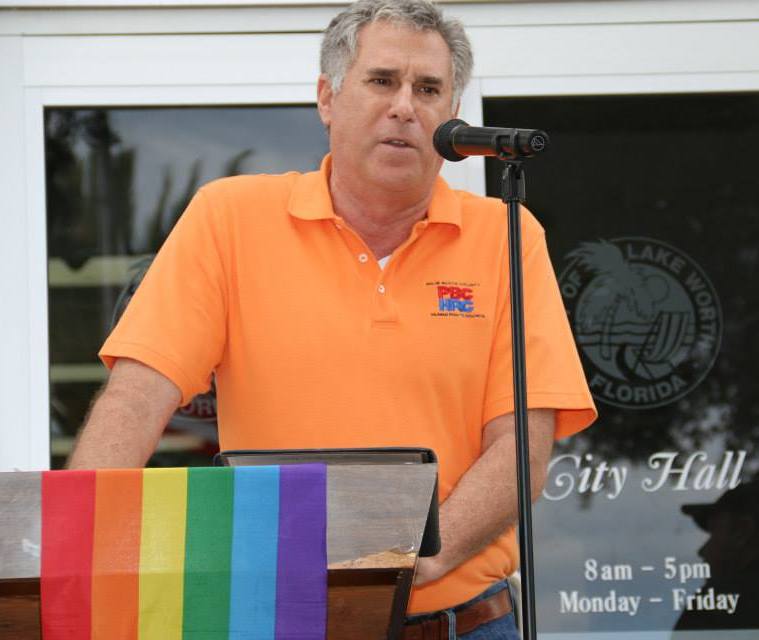By Wayne Washington - Palm Beach Post Staff Writer
September 23, 2015
WEST PALM BEACH — With demands for freedom of religious expression spilling into the presidential race — and sparking fears of renewed discrimination — Palm Beach County vastly expanded the types of businesses that are expressly barred from discriminating against customers and would-be customers.
At the urging of the Palm Beach County Human Rights Council — a group best known for its work in protecting the rights of gays and lesbians — the County Commission voted 6-0 Tuesday to expand the definition of what is considered a “public accommodation.”
The county’s anti-discrimination law has, for a quarter century, barred discrimination in public accommodations, typically thought of as restaurants and places of lodging and entertainment.
Now, though, the county has expanded the definition of public accommodation to include a broad range of businesses, including retail outlets and places of transportation.
“This is really a big deal,” said Rand Hoch, the president and founder of the West Palm branch of the Human Rights Council. “This is just putting it out there that if you hold yourself out there to serve the general public, you can’t do that if you’re going to discriminate against members of that public.”
Hoch alluded to incidents in Florida and other states to highlight the potentially sweeping impact of the county’s expanded ordinance, which was first discussed in August.
On Monday, a transgender woman live-tweeted her experience of being detained by security officials at Orlando International Airport because of what they described as “an anomaly,” her penis.
The woman said she missed her flight.
“Yesterday, the airport (in Palm Beach County) wasn’t a public accommodation,” Hoch said. “Today, the airport is a public accommodation.”
Owners of an Indiana bakery made national news last year when, citing religious objections, they refused to bake a wedding cake for a gay couple.
After Indiana passed a “religious tolerance” law some saw as giving businesses permission to discriminate, many canceled vacations and conventions in the state. The law was eventually modified.
The bakery, boycotted by some who saw its actions as discriminatory, closed in December, though its owners said it remained financially viable.
“Today, the bakery is a public accommodation,” Hoch said, adding that a bakery in Palm Beach County could not legally refuse to bake a wedding cake for a gay couple.
Since it was passed in 1973, Palm Beach County’s anti-discrimination ordinance has been modified to include additional groups of people, but the limited definition of a public accommodation remained, a sort of relic, Hoch said, of the civil rights-era protests that led to its creation.
First-time violators of Palm Beach County’s anti-discrimination ordinance can be fined as much as $10,000. A second violation within five years could bring a fine of up to $25,000. And three violations within seven years could mean a fine of as much as $50,000.
Complainants can sue in court or go to the Fair Housing Board.
Demands for freedom of religious expression exploded into the presidential race this year when Kim Davis, an elected county clerk in Kentucky, said her religious faith compelled her to refuse to issue the wedding licenses to gay couples, despite a recent U.S. Supreme Court decision requiring it.
On the day of her release, Davis was greeted by two Republican Party candidates for the president — U.S. Sen. Ted Cruz of Texas and former Arkansas Gov. Mike Huckabee. Both men praised her and blasted her jailing as the “criminalization” of Christianity. Others, however, argued that Davis’ behavior was homophobic, discriminatory and illegal.
“This is the real world,” Palm Beach County Commissioner Priscilla Taylor said. “Discrimination still exists.”
When the Human Rights Council first asked the County Commission to expand the definition of places of public accommodation last January, “its main priority was to prohibit consumer racism in retail stores — a practice known as ‘shopping while black,’ ” Hoch said.
The experience of people of color being refused service, or given poor service, is not uncommon. Many African Americans describe as a sort of black right of passage being followed in a store or being asked, repeatedly, “Can I help you?”
Hoch said the Human Rights Council gets two or three calls a year from black residents describing an unpleasant shopping experience. According to the council, the complaints include being wrongly detained, steered away from certain products and asked for additional forms of identification regarding credit applications.
“They’d say they were followed in the store and treated like a criminal,” Hoch said. “They said it was embarrassing.”
Palm Beach County’s expanded ordinance puts it on legal par with other counties in the southern part of the state. Hoch, however, said he’d like the see it adopted by the state Legislature.
Previous efforts to expand the state’s anti-discrimination laws have failed.
Typically, the push back against expanding anti-discrimination laws have come from business owners worried about being sued.
Officials with the Business Political Action Committee of Palm Beach County could not be reached for comment on the county’s expanded ordinance. Danny Martell, president and chief executive officer of the Economic Council of Palm Beach County, said he does not know enough about the expanded ordinance to comment on it.
Commissioners passed changes to the ordinance without comment on Tuesday, but that doesn’t diminish the importance of the move, Taylor said.
“I don’t think we can do too much to protect the rights of people,” she said.
WHAT THE LAW MEANS
Retail businesses and places of travel join restaurants, bars and places of lodging and entertainment on the list of “places of public accommodation” that legally cannot discriminate based on race, sex, color, religion, national origin, disability, familial status, sexual orientation, age, marital status, and gender identity or expression.
That means Palm Beach County could issue fines to stores whose employees give inferior service to black customers based on their race or to bakeries that refuse to sell a wedding cake to a gay couple.
Retail businesses and places of travel join restaurants, bars and places of lodging and entertainment on the list of “places of public accommodation” that legally cannot discriminate based on race, sex, color, religion, national origin, disability, familial status, sexual orientation, age, marital status, and gender identity or expression.
That means Palm Beach County could issue fines to stores whose employees give inferior service to black customers based on their race or to bakeries that refuse to sell a wedding cake to a gay couple.


 "The ordinance traced its roots back to civil rights laws written in
the 1960s when it was legal to have 'Whites only' hotels, restaurants
and bars and the County Commissioners only addressed inequities had
occurred in very few places of commerce," explains Rand Hoch, President
and Founder of the Palm Beach County Human Rights Council. "As we know,
discriminatory acts are not limited to those few places."
"The ordinance traced its roots back to civil rights laws written in
the 1960s when it was legal to have 'Whites only' hotels, restaurants
and bars and the County Commissioners only addressed inequities had
occurred in very few places of commerce," explains Rand Hoch, President
and Founder of the Palm Beach County Human Rights Council. "As we know,
discriminatory acts are not limited to those few places." 


